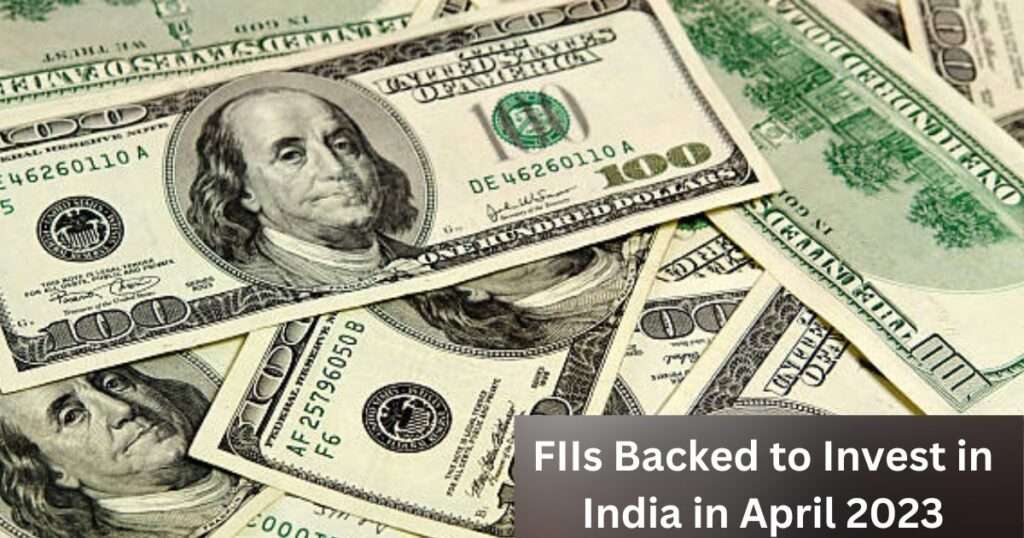The previous several trading days have seen FPIs engage in strong purchasing, resulting in a total inflow of $11.631 billion into Indian stocks during April, making it the largest monthly investment of 2023 to yet. FPIs have been net purchasers of stocks for the last two months in a row.

FPIs invested, Despite Q4 IT outcomes
In April, foreign portfolio investors (FPIs) purchased the most Indian stocks of any month in 2023, to the tune of Rs. 11,631 crore. FPIs would be purchasers for the second month in a row in this case. Both the Sensex and Nifty 50 have performed well in April despite the IT sector’s disappointing Q4 results, which caused a significant selloff in IT giants.
NSE FPIs Data
In April 2023, FPIs bought equity worth 11,631 crore, according to NSDL statistics. In the same month, loan and debt-VRR investments totaled 806 crore and 1,235 crore. FPIs sell 126 crore in hybrid markets.
In April, FPIs invested 13,545 crore in the Indian market (including stocks, debt, debt-VRR, and hybrid) owing to robust equity market purchasing.
“FPIs appear to have changed their investment strategy in India in recent days,” According to Geojit Financial Services’ Chief Investment Strategist Dr. V K Vijayakumar. The first three months of the year had them as sellers, but in April they flipped to buys, with the final few days of the month seeing unusually intense buying activity.
In April, the Sensex rose by almost 2,121 points, or 3.60%, while the Nifty 50 surged by more than 705 points, or 4.06%.
The Sensex is now at 61,112.44, up 463.06 points (0.76%), while the Nifty 50 is up 149.95 points (0.84%) at 18,065. The market closes for the month of April on the 28th.
Foreign portfolio investors poured 7,936 crore into the share market in March, making them net purchasers.
Foreign portfolio investors poured 7,936 crore into the share market in March, making them net purchasers. The FPI strategy has been skewed by the rise of the rupee, which is a significant macro issue.
For good measure, Vijaykumar said, “Rupee, which had touched a low of 82.94 to the dollar in late February this year, has now appreciated to 81.75 to the dollar.”
The analyst went on to say that the future looked promising for the rupee if the pattern of the shrinking Current Account Deficit in India continued. Foreign direct investment (FPI) is expected to increase inflows into India. Foreign portfolio investors have been buyers of financial services, automobiles, and automobile parts.
There has been an outflow of 14,579 crore from Indian shares held by foreign portfolio investors so far this year. In 2023, the largest monthly outflow of 28,852 crore was seen in January. While foreign portfolio investors sold 5,294 crore in February.
Why stock market rose previous five sessions?
The Nifty index has been on an upswing since it gave a breakthrough around 17,200 levels, and it gave another breakout on Friday by closing over 18,000. Strong quarterly results by major businesses like ICICI Bank, Axis Bank, Bajaj Auto, Maruti Suzuki, and Nestle fueled the Indian stock market rise, they claimed, while a weaker US currency attracted FIIs back to Indian equities markets. They predicted that the market rally will quicken in the following sessions after the Bank Nifty index broke above its previous swing high, but they predicted that the Nifty would continue to outperform other important benchmark indexes thanks to the recent breakout.
Who are FPIs?
Ans. Investing in financial assets of a foreign nation, such as stocks or bonds offered on an exchange, is referred to as foreign portfolio investment (FPI in full). FPI includes the acquisition of readily transferable securities.
Who are FII companies?
Ans. Foreign institutional investors (FIIs) are defined as institutional investors who make investments in assets that are located in nations other than their own.
What are the two types of FPI?
Ans. FPI Category I (or low risk): This category includes financial assets that are supported by the Indian Government.
Category II (or moderate risk):Regulatory broad-based funds, such as mutual funds, pension funds, insurance policies, bank deposits, etc. are included in
Open Your Demat Account with Discount Brokers:
ZERODHA : https://zerodha.com/open-account?c=EJ4366
or with Angelone: https://tinyurl.com/2gloc3g6









